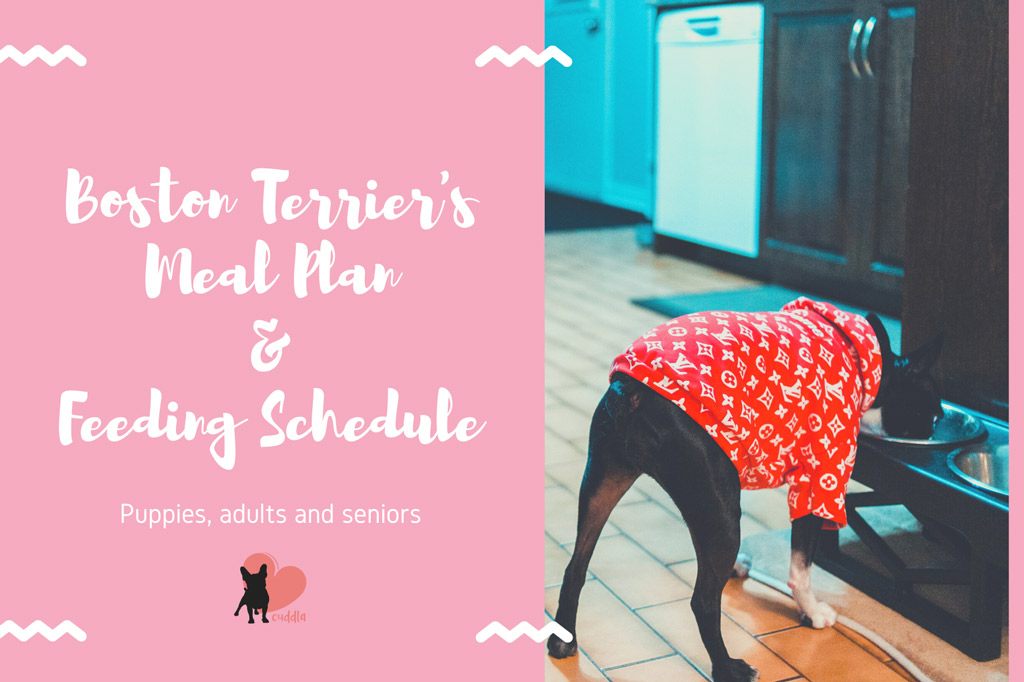
Overfeeding your Boston Terrier will lead to weight gain, obesity problems and other health issues.
So knowing how much to feed Boston Terriers is one of the most caring things you can do for your pooch. Here’s a glimpse at what you should know:
Boston Terriers should eat between 1/2 to 2 cups each day, depending on their weight. A 10 pound (4.5 kg) Boston Terrier should eat 1 cup per day and a 25 pound (11 kg) Boston Terrier should eat 2 cups per day.
However, food quantity and feeding schedule depend on many factors, including age and activity levels.
Continue reading to find out more!
How Much to Feed Boston Terriers?
As a general rule of thumb, the amount you feed your Boston Terrier should be based on:
- Size: How big your pooch is will influence how much food she needs.
- Age: Depending on the life stage, your dog has different nutritional needs. For example, puppies need milk as a major food item while an adult dog will need meat.
- Bodyweight: If your pooch suffers from obesity or has gained weight recently, you should limit her food intake.
- Metabolism: This has to do with how your dog digests food. Boston Terriers have a fast metabolism with a high need for energy.
- Activity levels: Active Boston Terriers need more food intake, for instance.
- Spayed or Neutered: Boston Terriers that have been spayed (female dogs) or neutered (male dogs) have a greater risk of becoming overweight than dogs whose sexual organs are intact (source).
- Environmental Variables (Temperature): Usually, during hot temperatures, a dog’s appetite diminishes.
How many calories should a Boston Terrier eat?
According to a study published by the National Research Council of the National Academies, a 10-pound (4.5kg), active adult Boston Terrier should eat 404 calories per day.
| AGE | WEIGHT | CALORIES PER DAY |
|---|---|---|
| Young Active Boston Terrier | 10 lb (4.5kg) | 436 |
| Adult Active Boston Terrier | 10 lb (4.5kg) | 404 |
| Senior Active Boston Terrier | 10 lb (4.5kg) | 327 |
| Pregnant and Nursing Boston Terrier | 10 lb (4.5kg) | 518 |
| Senior Inactive Boston Terrier | 10 lb (4.5kg) | 296 |
For more precise and individual metrics, use the Pet Alliance Nutrition calorie calculator here.
Then, how much should you feed a Boston Terrier?
An adult Boston Terrier’s weight varies from 10 to 25 pounds (4.5 to 11 kg) depending on her size. Generally, she will eat between 1-2 cups of food a day, depending on size, age and activity level.
If your Boston Terrier weighs 10 pounds (4.5 kg), you can feed her 1 cup per day. However, if your Boston is closer to 25 pounds (11 kg), you can feed her 2 cups per day.
So, Boston Terriers should receive between 1/2 to 2 cups each day, depending on their weight.
| BOSTON TERRIER WEIGHT | FOOD QUANTITY PER DAY |
|---|---|
| 5 to 10 lb (2.3 to 4.5kg) | 1/2 to 1 cup |
| 10 to 15 lb (4.5 to 6.8kg) | 1 to 1 1/2 |
| 15 to 20 lb (6.8 to 9.1kg) | 1 1/2 to 1 2/3 |
| 20 to 25 lb (9.1 to 11.3kg) | 1 2/3 to 2 cups |
P.S. You can get a measuring cup set on Amazon to make your life a bit easier as your Boston Terrier’s food needs may change throughout her life. For me, it’s the easiest way to calculate each meal. 🙂
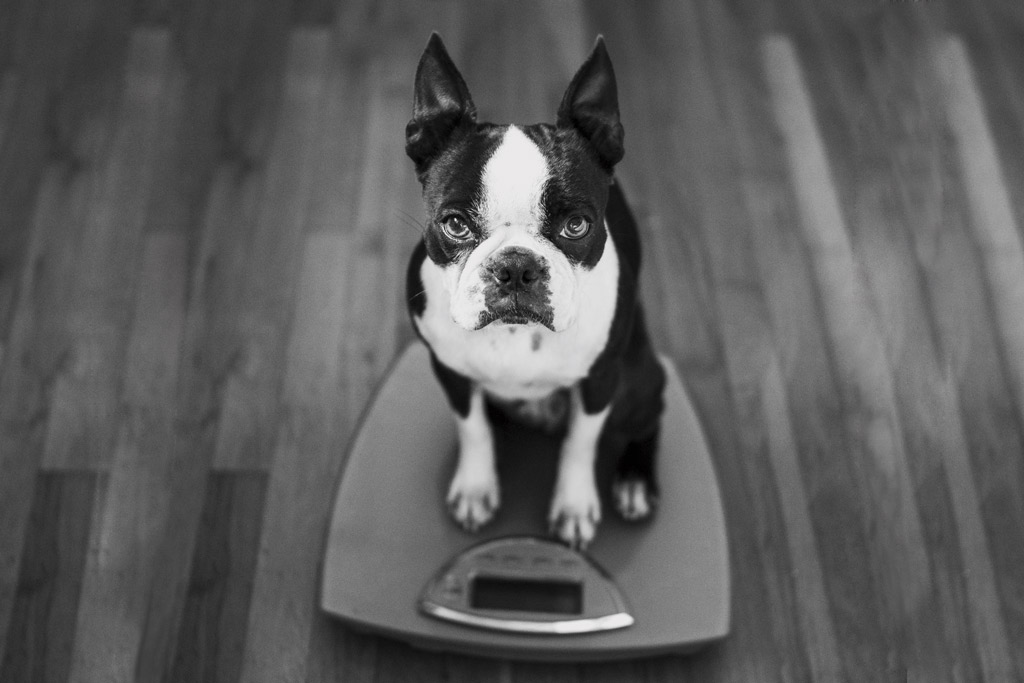
Boston Terriers’ Dietary Needs
A Boston Terrier’s diet should be healthy, balanced and species-appropriate.
Before I go any further into the subject, here’s a disclaimer:

I am not a veterinarian, so always check with your vet before changing your Boston Terrier’s diet to avoid unexpected consequences.
However, I do have knowledge of dog nutrition and dietary needs.
Here are the essential nutrients for Boston Terriers:
- Fats: Healthy fats are the main source of energy for dogs. Moderate level of animal fat from salmon and sardines. Also, dogs can get higher quantities of omega-3 from krill oil.
- Proteins: Dogs also need plenty of animal protein in their diet. High-quality protein from lean-muscle meats (chicken, beef, turkey), fish (salmon and sardines) and eggs.
- Vitamins and minerals: Dogs can get these from vegetables like broccoli, kale and carrots. Also, from fruits like apples, bananas and blueberries.
- Water: Your Boston Terrier should drink fresh and filtered water daily.
However, Boston Terriers have no need for the following ingredients:
- Grains.
- Rice.
- Potatoes.
- Corn.
- Soy.
Boston Terriers can suffer from allergies and ingredients like grains, corn and soy are usually responsible for their food allergies.
Read also: Boston Terrier Diet – where I also discuss Food Allergies and the best diet for Allergic Boston Terriers.
Depending on your Boston Terrier’s age, her dietary needs vary. Let’s have a look at what Boston Terriers’ dietary needs are, at each stage:
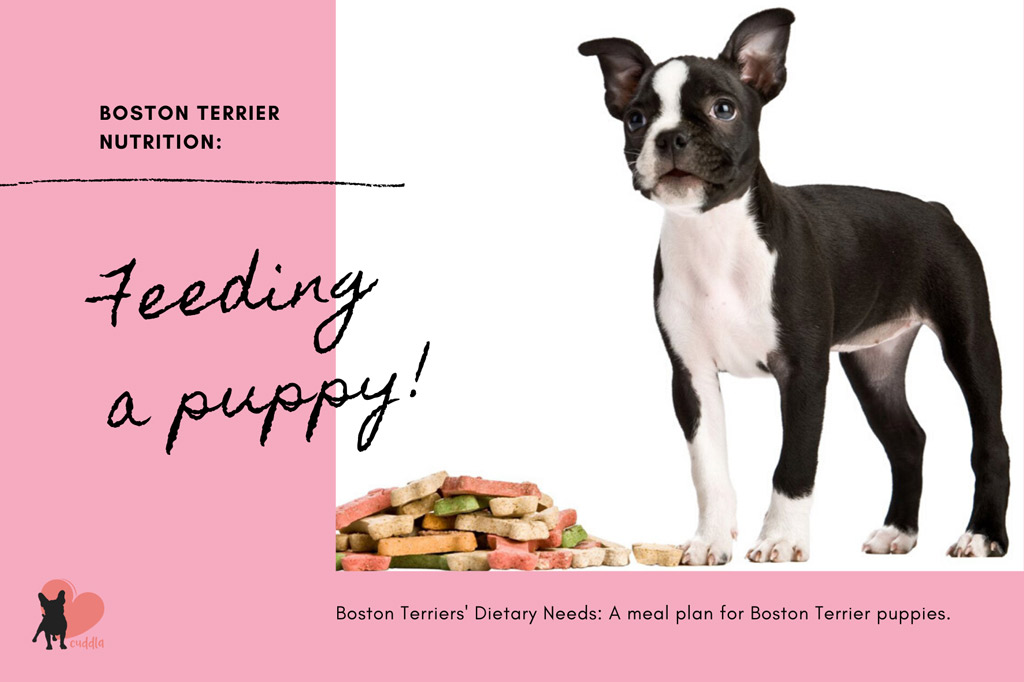
Meal Plan for Boston Terrier Puppies
Puppies should not be separated from their mom before they are at least 8 weeks old, so they get all the nutrients they need to grow from their mother.
However, if you find yourself having to feed an orphaned puppy, 5% of her body weight may be taken as food quantity measure.
Puppies need greater amounts of protein and fat than adult dogs. Also, unlike adult dogs, puppies need to be fed restricted amounts of food but with more frequency.
According to the National Research Council (source), a growing puppy requires about 29% protein and 8% fat of her body weight.
Once they get older, the amount will be increased but the frequency of feeding is often decreased in many occasions.
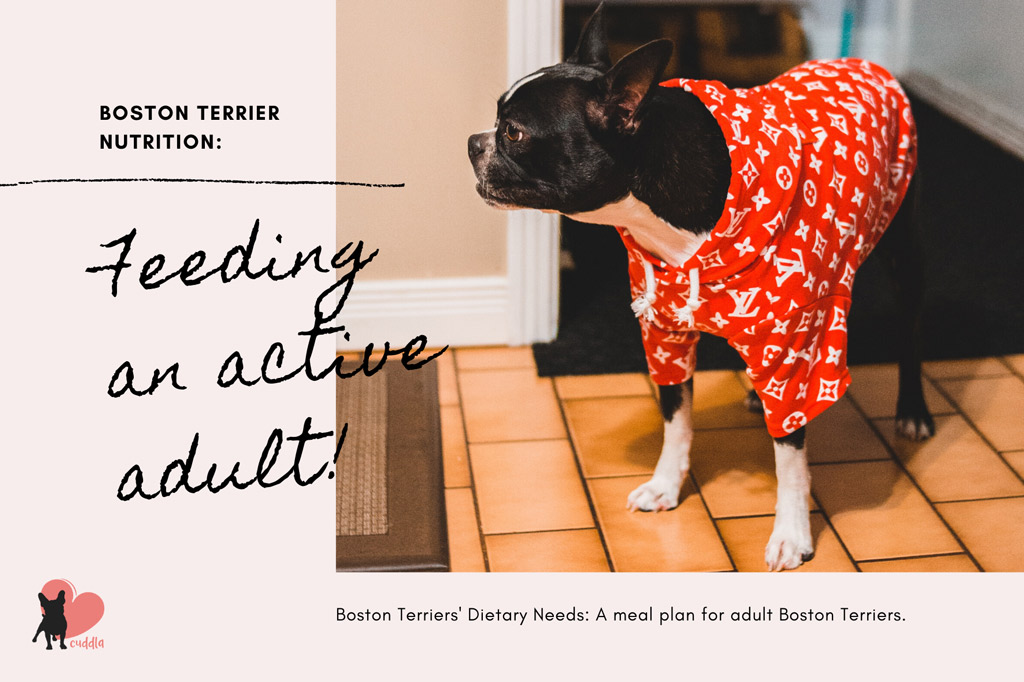
Meal Plan for Adult Boston Terriers
When a dog reaches 90% of its expected adult weight, it’s considered an adult in terms of feeding purposes. Boston Terriers stop growing and reach adulthood between 12 to 14 months.
According to the National Research Council (source), an adult dog needs between 20-25% protein and 10-15% fat of her body weight.
Remember that an active Boston Terrier may require 20% more food.
If your Boston Terrier has any health condition, talk to your vet to adjust your dog’s diet accordingly, including the daily intake of food.
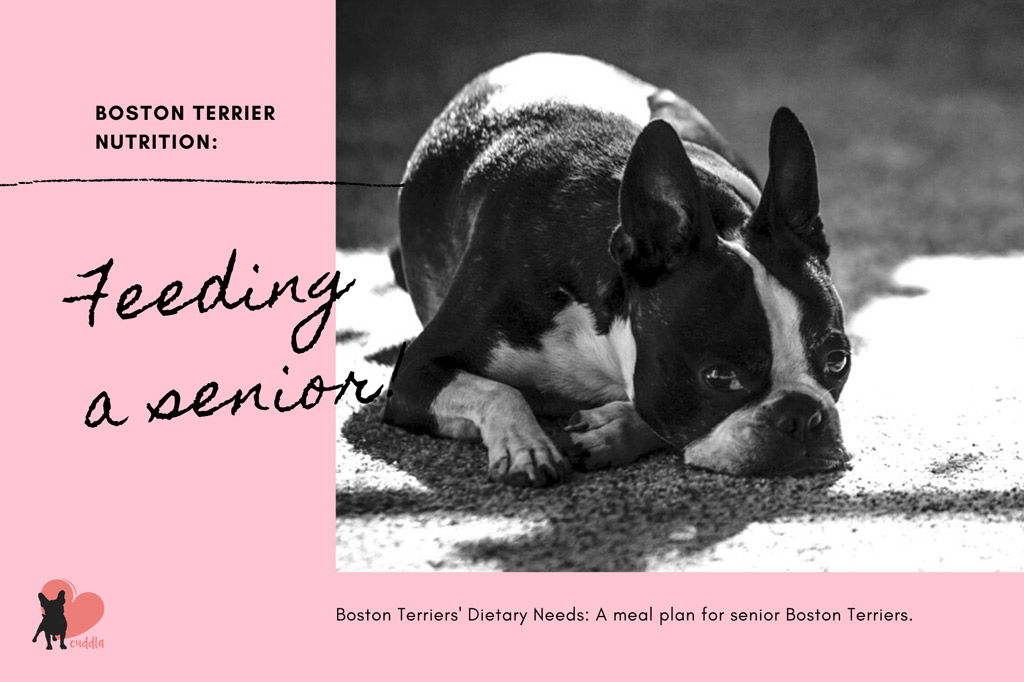
Meal Plan for Senior Boston Terriers
With an expected lifespan of 11 to 13 years, your Boston Terrier will reach the senior stage when she’s 7 to 8 years old.
As your Boston Terrier gets older, the amount of physical activity decreases and her metabolism slows down. That’s why senior Boston Terriers need 20% fewer total calories than active adult dogs.
You should reduce the amount of protein your BT gets for two reasons:
- Feeding them too much protein may finally lead to overburdening a dog’s renal structures and result in damaging the filters in her kidneys. This is true especially when the immune system of a dog is compromised due to many factors.
- Seniors also need less food because their movements are more restricted; they are not as active as puppies or adult dogs. Hence, they spend a limited amount of energy.
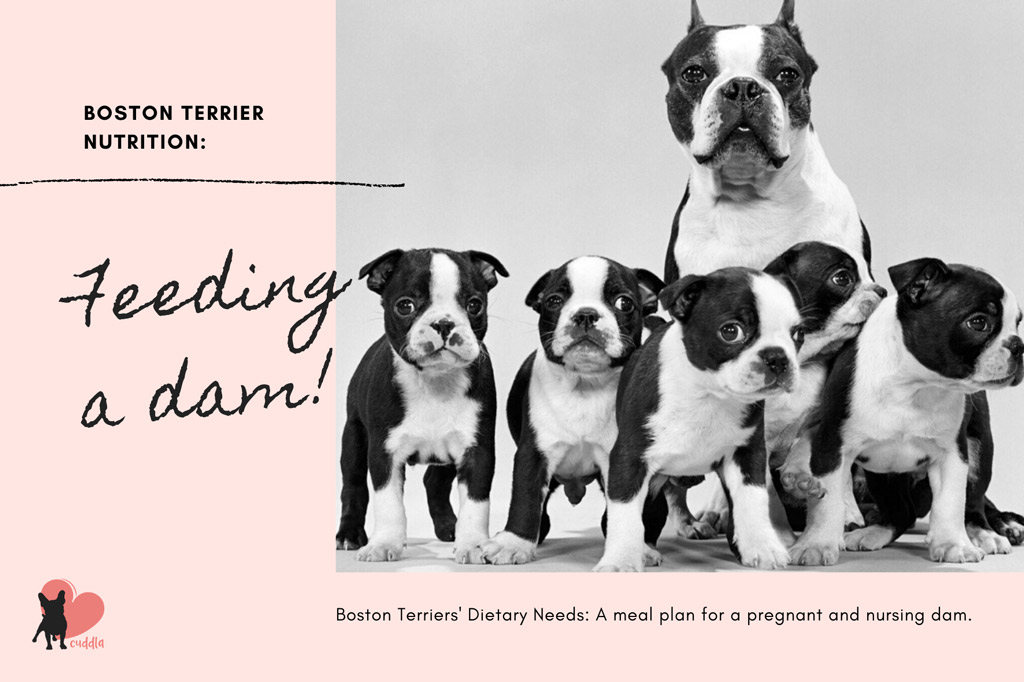
Meal Plan for Pregnant and Nursing Boston Terriers
Female Boston Terriers during pregnancy do not need to be fed a full stomach since it may cause some discomfort to them.
However, all pregnant and nursing dogs need special types of food that deliver a balanced type of nutrition with proper supplementation of vitamins and minerals.
Mothers generally nurse their puppies for at least 6 weeks. So, a nursing dam needs to be fed with enough amounts of calcium so there will not be any calcium-based deficiency and the bones of her puppies will be strong, without any curving.
Always check with your veterinarian to ensure that your Boston Terrier is getting the essential nutrients for each stage of her life. 🙂
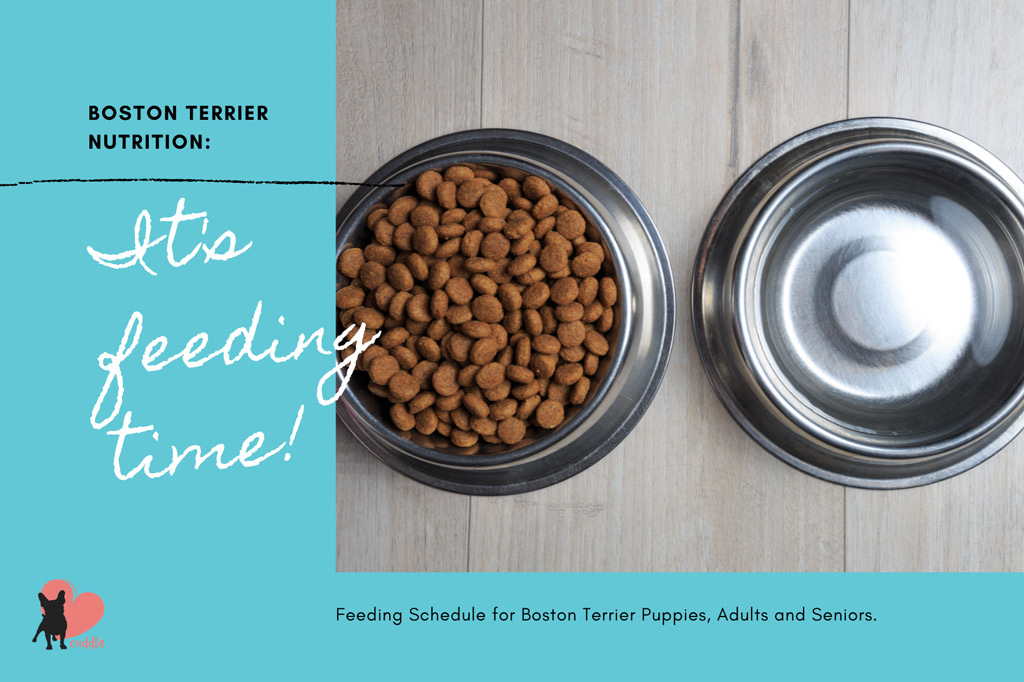
How Often to Feed Boston Terriers?
Again, the feeding schedule and the number of times you feed your Boston Terrier depends on the dog’s age. Setting a feeding schedule will help your pooch to follow her daily routine.
Remember that dogs thrive with consistency.
Feeding Schedule for Boston Terrier Puppies
1 To 6 Weeks of Age
The dam will nurse her puppies five to seven times per day.
They will probably make some sound if they get hungry. Once puppies are 5 weeks old, they will start sampling some solid food.
Note: Puppies should not be separated from their mothers before 8 weeks of age. During that time, their mother’s milk provides the necessary nutrition to become strong and healthy.
6 Weeks To 12 Months
After puppies are 6 weeks old, their feeding frequency may be reduced.
From 8 weeks onwards, you will start to gradually reduce the number of times you feed your pup until you settle on 2 meals when she’s 1 year old.
| BOSTON TERRIER AGE | NUMBER OF MEALS A DAY |
|---|---|
| 8 weeks | 5 meals |
| 3 months | 4 meals |
| 6 months | 3 meals |
| 12 months | 2 meals |
Feeding Schedule for Adult Boston Terriers
Traditionally, it has been recommended that adult dogs (from 12 months and older) should be fed just once a day.
However, you can feed your adult Boston Terriers twice a day: breakfast and dinner. Giving two meals a day may make it easier for the dog to digest the food (avoiding getting bloated) and helps control hunger.
Feeding Schedule for Senior Boston Terriers
When your Boston Terrier reaches 7 to 8 years old, she will begin to show visible age-related changes.
She will go through some metabolic, immunologic and body composition changes. Some of these may be unavoidable while others can be managed with diet.
You can continue to feed your senior Boston Terrier twice a day (breakfast and dinner) to encourage easier digestion.
When feeding your senior pooch, the main objective should be to maintain health and optimum body weight. This can help to slow down the development of chronic disease and minimize diseases that may already be present.
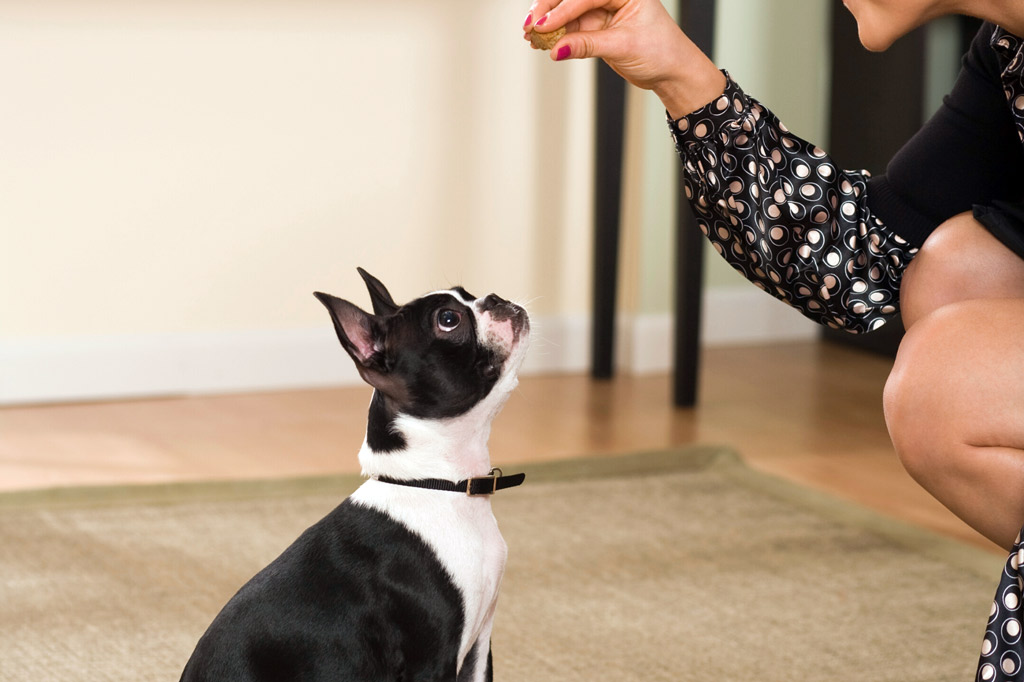
Ways to Feed Boston Terriers
If you decide to feed your Boston Terrier twice a day…
You should divide the total amount of calories into two meals and space them during the day; you can give your dog breakfast and dinner, for example.
Also, treats should be accounted for on your dog’s daily food intake (i.e., the total amount of calories per day). That’s why you should put aside a small portion of your Boston Terrier’s meal to reward her good behaviour.
Boston Terrier Treats – even very healthy ones – should not constitute more than 15% of your dog’s daily food intake, and preferably less than 10%.
Once you know how much and how often you are going to feed your Boston Terrier… There are three ways to feed your pooch:
- Hand-feeding.
- Feeding bowl.
- Dispenser toys.
Whatever method or methods you decide to use, the best and most important thing you can do is to stay consist. This way your Boston Terrier knows what to expect and won’t go hungry.
Hand-Feeding Your Boston Terrier
While you may decide to keep two main meals (breakfast and dinner), you can use 10% of the daily meal allowance as treats. You can use that 10% during training sessions, for instance.
Another option is to use part of the meal (from 20 to 70%) and hand-feed it to your pooch, instead of using a feeding bowl. Some dog trainers recommend using that 70% throughout the day.
This method helps to build a strong relationship where your dog looks up to you in expectation.
Using a Bowl to Feed Your Boston Terrier
Establish a feeding area in your dog’s safe space where you can place your dog’s bowls for food and water.
This method has many benefits:
- It reinforces a positive association that your pup has with her safe area.
- It provides a stress-free mealtime away from the household hustle and bustle.
- Setting a feeding area can help prevent food guarding behaviour and possible incidents for you and the children in your family. Ideally, your Boston Terrier is properly socialized and allows you to grab her bowl anytime or interrupt her meal if needed without consequences.
When using a bowl, you can practice timed feeding.
This means that you remove her food bowl after 30 minutes, regardless of food being left in it. But, always keep a water bowl around with fresh water.
Using Dispenser Toys To Feed Your Boston Terrier
Finally, you can further divide your dog’s meal into more portions using a stuffed toy like a Kong (Amazon link). This method works for all ages (puppies, adults and senior dogs).
Dispenser toys are a great solution to keep your dog entertained (and mentally stimulated) when you are not around.
Also, they help your pooch to slow down when eating!
Alternatively, you can use a slow feeder mat. I find them very useful to keep a dog entertained whilst grooming! 🙂
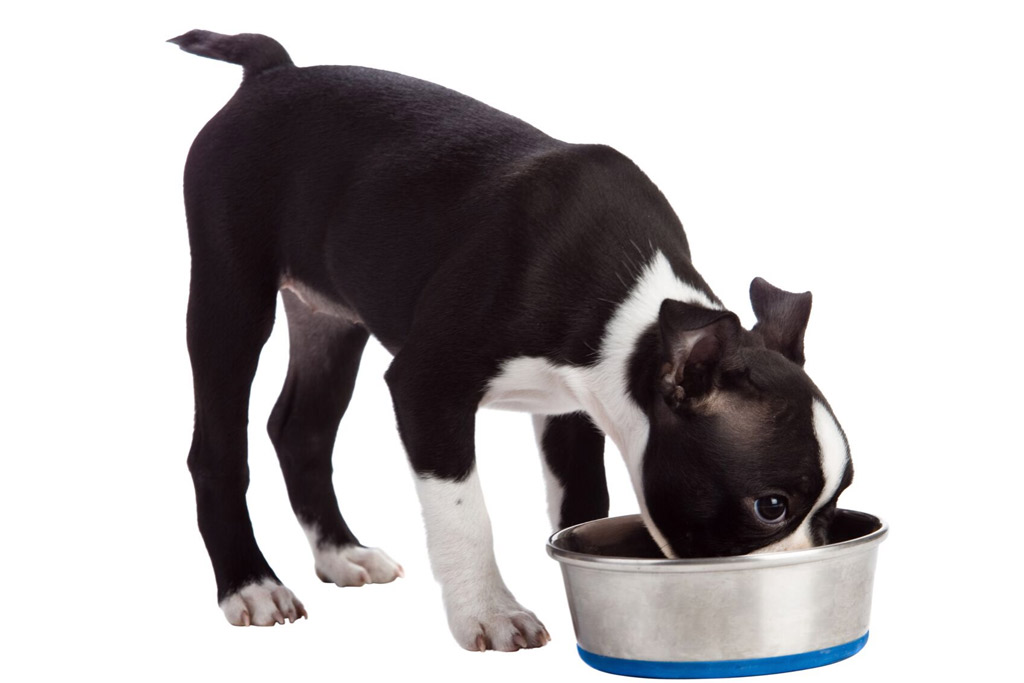
How Much Water Should a Boston Terrier Drink?
According to PetMed, a healthy Boston Terrier should drink about 1 cup (8oz) per 5 pounds of its body weight. A 15-pound Boston Terrier, for example, should drink between 7.5 to 15 ounces per day, or about 1 to 2 cups.
| BOSTON TERRIER WEIGHT | WATER QUANTITY IN OUNCES | WATER QUANTITY IN CUPS |
|---|---|---|
| 5 to 10lb (2.3 to 4.5kg) | 8oz per day | 1 per day |
| 15 to 25lb (6.8 to 11kg) | 8 to 15oz per day | 1 to 2 per day |
Note: If your Boston Terrier drinks a lot more than that, it may signal a health problem. You should check with your veterinarian if that’s the case.
Here are some optimal guidelines to know how much water your Boston Terrier should drink daily:
- Size: On average, a healthy Boston Terrier drinks about 1 cup (8oz) per 5 pounds of her body weight per day.
- Food: A healthy diet is as important as water and the type of food your dog eats affects their water intake. Also, avoid ingredients that can artificially increase your dog’s thirst, such as sodium.
- Age: Puppies generally drink more than adult dogs. Pups need about a 1/2 cup every two hours and need to be closely monitored. Adult dogs tend to naturally monitor themselves.
- Exercise: Really active or lactating dogs may need more water. Bring water along on any exercise excursion with your dog. After exercise, just give her little water at a time to prevent bloat.
- Weather: Hot summer weather means more panting, i.e., dogs experience an increase in water intake.
- Medications: Check with your vet to see if you need to decrease or increase your dog’s water intake while taking a medication.
Insider Tip: Dogs fed high-moisture foods typically drink less than kibble-fed dogs.
Drinking Schedule for Boston Terriers
Your Boston Terrier should have access to fresh and filtered (if necessary) water at all times. Make sure you replace your doggie’s water throughout the day to ensure that it stays clean.
Whilst adult dogs self-regulate their water intake to meet their needs, pups should be monitored.
Your Boston Terrier could under-drink or over-drink, both cases can have severe consequences:
- Under-drinking: Too little water can lead to dehydration, kidney stones, organ failure and even death.
- Over-drinking: On the contrary, drinking too much water can lead to stomach bloat, electrolyte imbalances, and hyponatremia (water toxicity).
That’s why it’s good to keep an eye on the water bowl level!
Also, where your Boston Terrier drinks from is important! Stainless steel bowls are the safest; they don’t deteriorate or release dangerous substances. Also, they are the easiest to clean.
You can place the water bowl in or near your dog’s safe zone. If your pooch is a bit messy when she slurps water or drools a fair bit, consider a spill-proof water bowl instead or place an absorbent mat underneath her bowl.
Finally, you should clean your dog’s bowl regularly. It doesn’t matter if you give your pooch the cleanest water if it’s served in a dirty bowl. 😉

Hello,
We are in Australia. Which food brand/s do your recommend for our 7 month old, 17.20pounds Male Boston Terrier.
Your help is truely appreciated.
kindest regards
Dorothy
Hello Dorothy, while I can’t recommend particular brands, there are some guidelines you can follow for choosing one to not only meet your Boston’s nutritional needs, but also other criteria:
Your pup’s breeder is also a good point of reference for recommendations (if you haven’t done so already). But it’s also best to check with your vet before changing your Boston Terrier’s diet to avoid unexpected consequences.
Hope that helps.